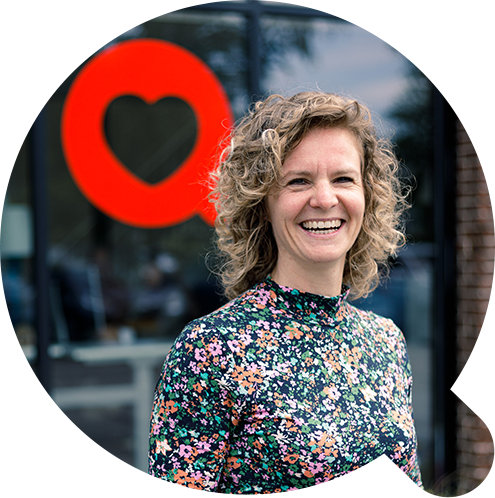Walk onto any shop floor or office and you’ll notice straight away: Generation Z is here. Young, full of energy, but often the subject of discussion. “They don’t want a full-time job, they lack responsibility, and they’re glued to their phones.” Sound familiar?
Millennials vs. Gen Z: does a generation gap really exist?
As a millennial, I wonder: are they really that different from us when we started out? Many of these stereotypes ring a little too familiar. In fact, they often say more about how we were perceived back then than about Gen Z now. And that’s exactly where an important insight lies for anyone working with young colleagues or meeting them as customers.
Looking in the mirror is never easy, but I’ll do it anyway. Pointing fingers is just too convenient. So let me go back to my own early years on the job market. When I was studying journalism, I was full of ideals. I honestly believed my stories could change the world.
But in reality, during my internships I was hesitant, insecure, and often overawed by colleagues who seemed to know exactly what they were doing.
That feeling is something you might recognise in today’s interns or young starters. Not unwilling, just finding their way. Exactly as we once did. The difference lies more in the context than in the people themselves.
First steps in the workplace are always daunting
Landing your first job always feels like a leap into the deep end. You don’t learn job interviews from a book, you learn by doing them. And yes, you can now ask ChatGPT anything, but in the end, it’s you sitting in that interview chair.
Gen Z has to figure out how to take responsibility, earn trust from colleagues, and find their footing in an organisation. Just like all of us once did. Which means Gen Z isn’t fundamentally different. It’s simply the context they grow up in that has changed.
Work and expectations: Shaped by upbringing
My parents followed a fairly traditional pattern: dad worked full-time, mum went part-time once my little brother and I went to school. For me, full-time work felt like the obvious path.
But now I see how differently millennials, and especially Gen Z, look at it: childcare is expensive, free time is precious, so why insist on working full-time?
If you’ve grown up with parents who both worked part-time, it feels only natural to want the same yourself. Plus, for Gen Z work is just one part of life, not the centre of it.
Free time above all: Gen Z chooses differently
Where millennials often chased “career success”, Gen Z places greater emphasis on balance. One less working day means one extra day of freedom. Honestly? If I’d had that option at their age, I’d probably have done the same.
And yes, the smartphone plays a huge role in their lives. But let’s be honest: hasn’t it become just as dominant in ours? Twenty years ago we insisted we didn’t need a mobile phone. Now we reach for it just as quickly as they do.

Purpose and sustainability: more than a buzzword
What strikes me in Deloitte’s research is this: almost all Dutch Gen Z (79%) and millennials (82%) say purpose is crucial for their job satisfaction and wellbeing. I recognise that. I never wanted “just a job” either, I wanted to do something meaningful. The difference is that generation Z demands it more explicitly.
The same study shows that they will even turn down jobs or projects if the values don’t match. And honestly? I admire that. It shows courage and authenticity. Sustainability is a key part of this: 59% of Dutch Gen Z and 62% of millennials actively take steps to reduce their environmental footprint. This isn’t just about words, it’s about actions.
You see this reflected in consumer behaviour too. According to the Retail Radar 2025 of Voyado, 40% of Gen Z set themselves a “shopping ban” from time to time, compared with only 4% of baby boomers. And 81% of Gen Z actively search for discount codes before buying something. Not just to save money, but because they are more critical about what their money is worth. Lazy? Far from it. Thoughtful and value-driven is more like it.
Responsibility has to be learned
And that supposed “lack of responsibility”? Perhaps we’re expecting too much, too soon. How much responsibility does an intern or new starter really get? Are they guided and given clear expectations, or left to figure it out themselves?
Responsibility develops step by step. We were given the space to grow and make mistakes. Why shouldn’t we offer Gen Z the same?
The generations are closer than you think
In the end, the differences are smaller than they appear. We too were once young, insecure, and looking for our place. Gen Z may approach things differently, but at the core it’s the same: everyone has to start somewhere.
Want to know what GROW25 revealed about Gen Z and the future of work?
FAQs about Gen Z and millennials in the workplace
What’s the biggest difference between Generation Z and Millennials at work?
Gen Z is more intentional about balance and flexibility, while millennials were typically more career-driven. The difference lies less in motivation, more in expectations. With learning solutions such as on-the-job learning and microlearnings from TinQwise, both generations can be supported at their own pace.
Why do Gen Z and Millennials place so much importance on purpose in their work?
According to Deloitte, 79% of Gen Z and 82% of millennials in the Netherlands see purpose as vital for job satisfaction. They want work that contributes to something bigger. With serious games and storytelling, TinQwise helps organisations make purpose tangible in day-to-day practice.
How does Generation Z view sustainability?
For Gen Z, sustainability isn’t a nice-to-have, it’s a must. 59% take concrete steps to reduce their impact. Through TinQwise learning programmes, themes such as sustainable working and customer-centric behaviour can be translated into real learning experiences, showing employees how their choices matter.
How can I better support Gen Z interns or starters?
By setting clear expectations and giving responsibility step by step. TinQwise designs onboarding journeys that don’t just teach the rules, but also let new employees experience the culture and values of the organisation right from the start.
Are Gen Z really less motivated?
No. They’re critical and intentional. The Retail Radar 2025 shows that 40% of Gen Z set themselves a shopping ban. That’s awareness, not laziness. With learning platforms that feel like social apps, TinQwise makes learning more engaging and shows that work can be both fun and meaningful.
What can I do as an employer to appeal to Gen Z?
Offer flexibility, make purpose visible, and invest in guidance. With TinQwise solutions such as retail learning platforms, snackable content and blended learning programmes, you can engage Gen Z in the way they want to learn: direct, interactive, and practical on the job.
Heading 1
with a request body that specifies how to map the columns of your import file to the associated CRM properties in HubSpot.... In the request JSON, define the import file details, including mapping the spreadsheet's columns to HubSpot data. Your request JSON should include the following fields:... entry for each column.
Heading 1
with a request body that specifies how to map the columns of your import file to the associated CRM properties in HubSpot.... In the request JSON, define the import file details, including mapping the spreadsheet's columns to HubSpot data. Your request JSON should include the following fields:... entry for each column.

